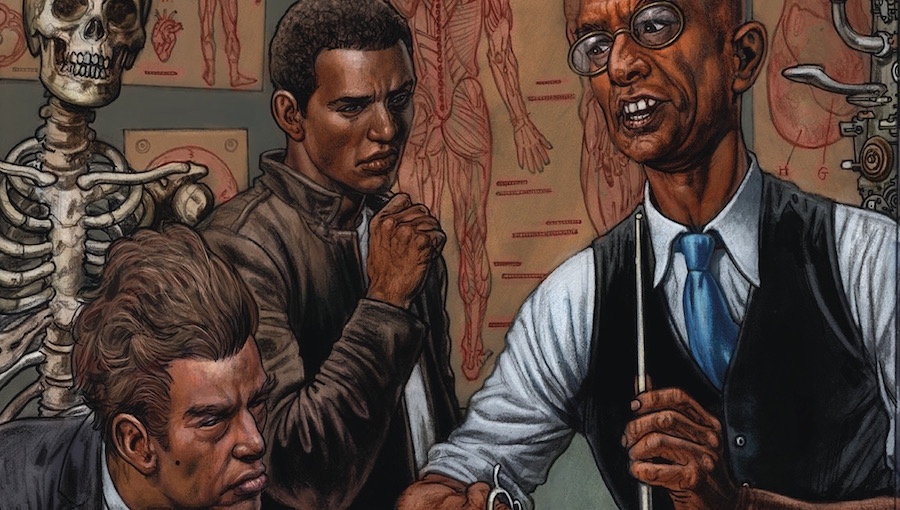American Gods: Shadows #8 continues to encourage us to think about American land and the land’s relationship with people. By providing some history of settlement in America, the series asks how our history contributes to how we identify as American today. And then, of course, there’s the mythos factor that shapes the American identity, as well.
Glenn Fabry and Adam Brown’s “Coming to America” fills half of this issue. It counters the idea that America is a land of opportunity and instead exposes the challenges of becoming successful. It brings in Arab mythology and shows the ways that even supernatural creatures struggle in America. This story also suggests that difficulties are cyclical and do not improve over time; they just get passed on to the next immigrant. Fabry and Brown’s episode makes modern-day America appear as just as difficult a place to survive as early America.
I appreciate the frequent breaks from the main narrative in this series. These other stories bridge history, mythology, and magic with Shadow’s tale, all offering commentary on American identity, the power of American soil, and the persistence of the supernatural. Nothing ever really seems pleasant, but the darkness, the despair, the confusion, and the frustrations all contribute to a path toward self-discovery. It is fitting, too, that much of “Coming to America” has to do with a taxicab. It provides a nice parallel to Shadow’s story in that both involve car travel, but the major difference is that the cab does not seem to get anywhere; drivers change, but the route stays the same. For Shadow, the vehicle changes, but he is able to continue on his journey.
There also exists a heavy focus on bodies and body parts. “Coming to America” shades and illuminates the eyes. David Mack’s variant cover is a beautifully warped illustration of this, as well. Shadow’s narrative, in being an autopsy scene, demonstrates how we can learn from the human body. I have to admit, I had a hard time reading the autopsy panels. They were a little disturbing, and while Scott Hampton does great work in this series, they were just a little too graphic for me. But they do their job nicely in focusing our attention on the story that a body can tell. Even if it is tragic or gruesome, the body can function as a narrative device. American Gods is all about storytelling and the power of mythology, so I do appreciate the layering that occurs in this issue.
Shadow’s scene in the bathroom is also very powerful as he contemplates his life. Literally reflecting upon his reflection, the mirror has a powerful effect over him, as if he is momentarily entranced. Shadow has to come back to reality (well, a mystical reality) and continue on his journey.
This issue left me more contemplative than usual. I think that American Gods, though at times gruesome and depressing, does offer a lot of opportunities to reflect on life’s journey and the paths that we take. It doesn’t sugarcoat anything and, instead, exposes the horrors found in dreams, offering perhaps a reality check for those in need of it—or at the very least, some perspective on what “American” really means for different people.

